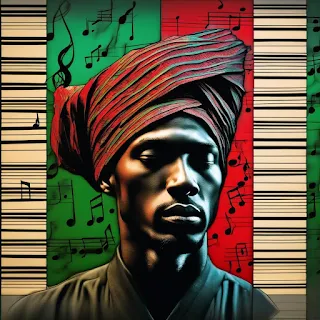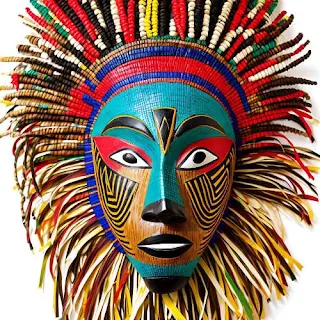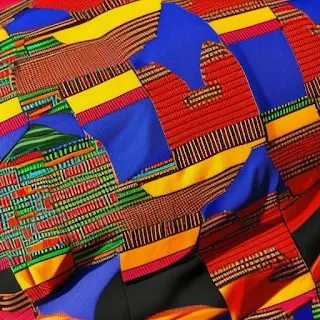Retaining Nothing of Africa Except the Color
Appearances alone do not convey a complete understanding or connection to Africa.
While someone or something may have physical characteristics or appearances associated with Africa, they lack a deeper meaningful connection to the continent. In other words, they may share a common racial or physical attribute with Africans but have little or no cultural, historical, or experiential ties to Africa.
Despite the different ways in which Africa is represented in diverse fields such as tourism, fashion, music, and cultural artifacts, these do not equate to a complete understanding of the African continent's land, people, and history. Simply dressing, dancing, talking, or touring Africa does not provide a comprehensive grasp of the continent's complexities.
Tourist Traps in Africa
In tourist destinations, businesses often aim to create an authentic African experience to attract visitors. This can include restaurants, lodges, and shops with African-themed decorations and staff members of African descent.
However, these businesses aim primarily to cater to tourists rather than genuinely represent African cultures. They may offer a simplified or stereotypical version of Africa that retains nothing of the continent except its aesthetic elements.
While looking so-called African, the staff may not have a deep understanding of the continent's diverse cultures, languages, and traditions. Their roles may be limited to portraying a certain image, such as wearing traditional clothing or performing dances, without a deeper cultural connection.
The term human safaris refers to a controversial and unethical practice that has occurred in some parts of Africa. It involves tours or excursions where tourists visit indigenous or marginalized communities to observe and interact with the local people as if they were zoo exhibits or wildlife safari exhibits. Human safaris contribute to the erosion of traditional cultures and lifestyles, as locals may feel compelled to modify their behaviors and appearances to cater to tourists.
Cultural Appropriation
Have you ever heard of cultural appropriation? It's when people adopt things from a culture that's not their own without truly understanding or respecting their cultural significance. It's a topic that sparks much debate and controversy in today's world.
For example, individuals from non-African backgrounds may wear African clothing, hairstyles, or accessories as a fashion statement without appreciating the cultural and historical contexts in which these elements are significant. This can lead to a situation where they retain nothing of Africa except the visual aspects.
Similarly, artists or musicians may use African themes or sounds in their work without crediting or understanding the origin of these influences. While these elements may enhance their artistry, they may lack a deeper connection to Africa's rich cultural tapestry. Wearing Kente cloth without understanding its meaning is a poignant example of cultural appropriation.
With its intricate patterns and vibrant colors, Kente cloth symbolizes pride, heritage, and identity for many African cultures, particularly in Ghana. Each pattern and color combination in Kente holds deep significance, often related to proverbs, historical events, or social status.
When individuals outside this cultural context wear Kente solely as a fashion statement or without comprehending the stories woven into the fabric, it diminishes its cultural significance and history. It's important to recognize that cultural appropriation can unintentionally perpetuate stereotypes and trivialize the rich traditions of African communities, emphasizing the importance of appreciating and respecting the meaning behind the garments we choose to wear.
Stolen Colonial Artifacts
Throughout the colonial era, European powers frequently acquired and transported a wide range of art and artifacts from numerous regions of Africa to Western countries. This practice involved the collection of objects such as masks, sculptures, textiles, and other cultural items, which were often considered valuable and significant representations of the diverse cultures and traditions throughout the continent.
Due to these collections, many of these items were permanently removed from the communities in which they originated, and they have since been the subject of ongoing debates and discussions regarding cultural heritage, ownership, and repatriation.
While these artifacts may have African origins, they were often acquired without the consent or understanding of the cultures they came from. As a result, they may be displayed in museums or private collections without a genuine connection to Africa beyond their physical presence.
The lack of context or appreciation for the cultural significance of these artifacts can mean that they retain nothing of Africa except their origins. They may be treated as mere curiosities or art objects divorced from their cultural and historical contexts.
Many museums have initiated processes for repatriating cultural artifacts to their countries of origin. This involves returning items that were acquired through colonial or unethical means. Repatriation aims to right historical wrongs and restore a sense of ownership and dignity to the communities from which the artifacts originated.
Museums increasingly use digital platforms to make collections accessible to a global audience. This includes digitizing artifacts and providing information about their cultural and historical significance online, making them accessible to source communities and the public.
The examples provided all share a common feature of shallow engagement with African elements, whether in a business setting, fashion, entertainment, or the handling of cultural artifacts. Although Africa's visual and aesthetic aspects are present, there's often a lack of a more profound comprehension, respect, or connection to the continent's diverse cultures, histories, and traditions.








